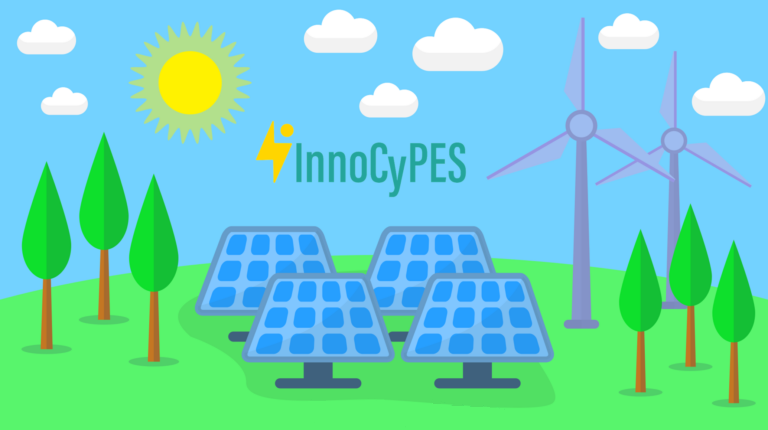InnoCyPES
Innovative Tools for Cyber-Physical Energy Systems
Overview

The principal goal of the InnoCyPES (Innovative Tools for Cyber-Physical Energy Systems) ITN is to provide world-leading and transferable scientific training to a new generation of 15 high-achieving early-stage researchers (ESRs). During their training, they will study, investigate and improve various facets of digitalized and interconnected energy systems. Supervised by a consortium of prominent and experienced academic institutions, research institutes and industrial partners, they will collaboratively develop a cutting-edge system management platform that covers the entire lifecycle of data for energy system planning, operation and maintenance, based on an understanding of the energy system as a cyber-physical system.
Project Description
The increasing volume, velocity, and variety of data from a massive number of dispersed “Internet of things” sensors in the energy system offers opportunities for improved operational efficiency and reliability – but it also results in threats in the form of computational burden and cyber-attacks. The transformation towards a fully digitalized energy system requires substantial improvements in coordinated design of cyber and physical systems, end-to-end data processing tools, and enabling changes in policy, incentive and regulatory mechanisms. Their absence acts as a barrier for the energy industry in translating the fast-accumulating data into actionable knowledge. The ESR projects will target key bottlenecks for this digital transformation. The tools that will be developed will be released as an open source platform for maximum impact.
Intended deliverables
• Cyber-Physical Smart-Grid Intrusion Detection: keeping a smart grid stable, robust, and secure, requires secure data flows. Although the complexity of cyber-physical systems can be challenging to manage, their cross-domain nature provides advantages for devising advanced intrusion detection schemes. An intrusion can be detected and classified, based on physical- and on cyber-patterns.
• Enriching System Measurements for Machine Learning Applications: the sheer quantum of data being created and collected across jurisdictions requires a carefully planned and proactive approach to data management. The need for fusion and integration of multiple data sources characterized by fragmented data ownership is driving innovative approaches to large-scale distributed data management and integration to avoid inconsistent and inaccurate data.
• developing methods for interpolation, imputation, and augmentation of the system measurements using a combination of machine learning and physical system knowledge.
• Deliver a decision-making tool to enable energy companies to optimally design and utilize the ICT infrastructure and develop digital solutions, considering end-to-end data lifecycle and solution.
Project Partners
Technical University of Denmark, Utrecht University (Universiteit Utrecht), Électricité de France, TU Delft, University of Salento, Norwegian University of Science and Technology, Imperial College London, Green Power Denmark, AIT Austrian Institute of Technology GmbH, Siemens Gamesa Renewable Energy S.A., TAJFUN HIL DRUSTVO SA OGRANICENOM ODGOVORNOSCU ZA ISTRAZIVANJE, PROIZVODNJU, TRGOVINU I USLUGE NOVI SAD

TUD Team

PhD Researcher:
K. (Kutay) Bölat

PhD Researcher:
N. (Nicola) Cibin

Responsible:
Dr. S. (Simon) Tindemans

Responsible:
Dr. A. (Alex) Stefanov

K. (Kutay) Bölat
Kutay Bölat is a PhD researcher under the Intelligent Electrical Power Grids (IEPG) group. He received his first Bachelor's degree in Electronics and Communication Engineering at Istanbul Technical University (ITU). Later, he earned his Bachelor's degree in Control and Automation Engineering as his second major from the same university and decided to continue his research under this department. Consequently, he completed his Master's education in Control and Automation Engineering at ITU. During his Bachelor's studies, he researched the design and implementation of next-generation (physical) communication systems, as well as indoor localization via channel state information. He focused his research towards the integrations between Deep Learning and Fuzzy Systems during his Master's. His research interests are mainly probabilistic machine learning, variational Bayesian methods, and (deep) generative models. His doctoral research is focused on the applications of these topics into electrical grid data in order to overcome practical shortcomings such as data unavailability, missing data, multi-rate fusion, and asynchronicity.

N. (Nicola) Cibin
Nicola Cibin is a PhD researcher under the Intelligent Electrical Power Grids (IEPG) group. He received his Bachelor's degree in Information Engineering and his Master's degree in Telecommunication Engineering at University of Padua. Consequently, he worked for two years at Aalborg University as research assistant, and he contributed to various European Union-funded projects tackling topics related to energy flexibility in the Smart Grid and ecosystems for smart buildings. During his Bachelor's studies, he researched the security of the 4G network and its susceptibility to DDoS attacks, while during his Master's ones, he focused on the automatic generation and analysis of attack graphs in computer networks. His research interests include Internet of Things (IoT), distributed systems, and network security, with a focus on blockchain applications and use cases. His doctoral research is focused on the cybersecurity and resilience of Distributed Energy Resources (DERs) deployed at the edge of the Smart Grid.